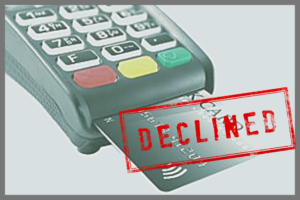If you accept credit cards at your place of business, you’ve likely dealt with chargebacks at one time or another.
For those that haven’t, chargebacks occur when a cardholder contacts their credit card-issuing bank and asks for a refund on a transaction for a purchase or service made on their card.
A chargeback can be a HUGE setback to say the very least. Not only is it a big pain in the rear to handle that equals wasted time and resources to resolve … you, the merchant, can potentially lose out on the money you’re owed AND face an additional chargeback fee from the processor.
That said, it makes good business sense to employ proactive practices in your business to prevent a customer from charging back a payment.
First, it’s good to know WHY most chargebacks happen. Some of the most common reasons are: customers don’t recognize a charge, a customer claims they cancelled services, the customer claims they didn’t receive the item they ordered, the customer is unhappy with the service or purchase, the customer claims it’s a fraudulent charge — a purchase was made with a stolen card.
All this said, here are several steps we advise taking to prevent chargebacks from happening in the first place:
1. Give out receipts for every single purchase.
In today’s fast-paced world, customers are often times inattentive to the purchases they make and with whom they made them. When customers don’t understand a charge, the likelihood of a chargeback increases. Be sure to provide receipts for every purchase to remind the customer of the purchase and its details.
2. Be ultra-clear about refunds, returns and cancellation policies.
First, make sure that the conditions of the sale are written on the receipt and that your customer receives a copy of the receipt, as stated in the previous tip. If you run a membership-based business that deals with membership contracts, make sure the cancellation policy is clearly stated on the contract and that the customer/member receives a copy of that contract.
It’s also a best practice to have your refund, return and cancellation policy listed on your website AND a sign near your register at your Point of Sale counter where customers can clearly read the policies.
3. Make sure charge descriptions are clear.
A lot of times customers will charge back their payment because they do not recognize a charge on their statement. A great practice to employ is the use of dynamic descriptors. Dynamic descriptors allow a merchant to define what appears on their customer’s credit card statement regarding the purchase. With dynamic descriptors, you can include specifics like the product purchased, business name, business location and contact information.
4. Include a phone number as part of the charge description.
If your customer sees a charge that they don’t recognize on their credit card statement, having a phone number as part of the dynamic descriptor will allow for easy communication and resolution.
5. Provide accurate descriptions of products and services.
This is particularly important to online ecommerce vendors where customers often dispute transactions because the product they received was not as it was described online. Make sure to have clear and accurate descriptions of your products and terms of services.
6. Get a signed proof of delivery for products.
Yet another important tip for online ecommerce vendors that ship products regularly. It’s best to use carriers that require signatures for delivery and also give you, the merchant/vendor, a copy of that signature for your records.
7. Communicate with customers about renewals.
We work with many membership-based businesses, including Fitness centers, country clubs and trade associations. These businesses have members that pay on a recurring monthly basis or pay in full for a year for their membership.
If your customer accounts are set to auto-renew, we strongly advise that you notify those customers of their renewal months leading up to the renewal date. Ongoing communication will go a long way to reduce chargebacks, as opposed to a new “renewal” charge showing up on a customer’s statement and the customer not knowing what the charge is for.
We hope you found this article to be beneficial. As always, we’re here to help. If you’d like more information on chargeback prevention and how Constellation Payments can assist, please don’t hesitate to give us a call at 888.244.2160.




